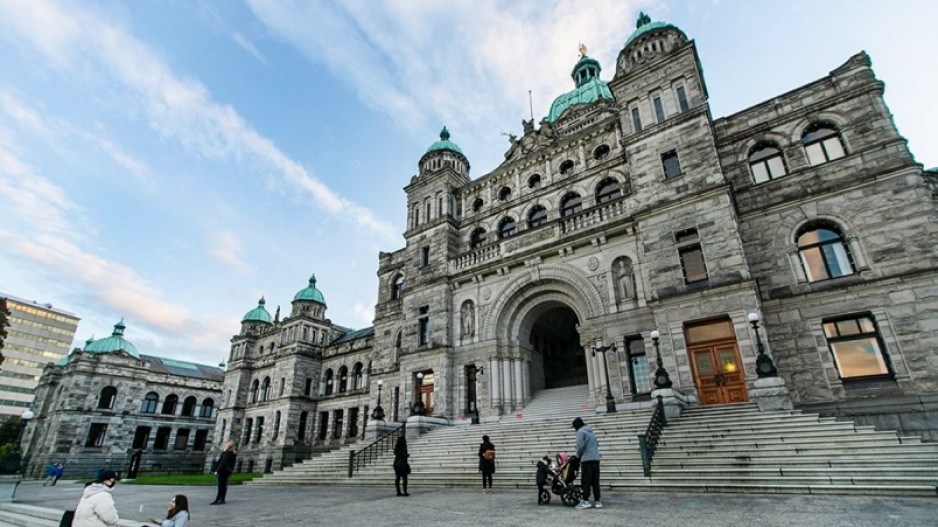Four months have passed since Research Co. and Glacier Media last looked at the political landscape of British Columbia.
Back then, some questions remained about the leadership of the governing BC New Democratic Party (NDP), as the province prepared to bid farewell to head of government John Horgan.
This month, housing, poverty and homelessness remains the most important issue facing British Columbia (34 per cent, down four points since October), followed by health care (29 per cent, up one point), the economy and jobs (13 per cent, up two points), the environment (six per cent, unchanged) and crime and public safety (five per cent, down three points).
As has been the case for the past few years, anxiety about housing is prevalent among British Columbians aged 18 to 34, while concerns about health care are significantly higher for those aged 55 and over.
On voting, the needle has barely moved. The BC New Democrats hold an eight-point lead over the BC Liberals among decided voters (44 per cent to 36 per cent), with the BC Green Party in third place (16 per cent) and the BC Conservatives in the low single digits (two per cent).
Women are heavily responsible for the good fortune of the BC NDP at this stage. Practically half of female decided voters in the province (48 per cent) would vote for the governing party if an election were held today, a significantly higher proportion than what the BC Liberals (28 per cent) and the BC Greens (20 per cent) currently garner.
A majority of British Columbians (59 per cent) approve of David Eby’s performance as premier and leader of the BC NDP, while 28 per cent disapprove and 13 per cent are undecided.
The two leaders of Opposition parties represented in the Legislative Assembly are also enjoying a good start of the year. The approval rating for BC Liberals leader Kevin Falcon stands at 44 per cent (up eight points). BC Greens leader Sonia Furstenau checks in at 42 per cent (up seven points).
We asked British Columbians about the two main party leaders. Eby has the upper hand over Falcon on managing eight issues, but there are areas where the leader of the opposition scores well.
More than a third of British Columbians think Eby is best suited to deal with housing, poverty and homelessness (40 per cent, with Falcon at 21 per cent), health care (40 per cent to 24 per cent), the environment (37 per cent to 18 per cent), education (37 per cent to 22 per cent) and accountability (35 per cent to 22 per cent). In three of these issues – education, health care and accountability – British Columbians have traditionally endorsed the BC NDP leader, going back as far as 2008 under Carole James.
The numbers tighten on three issues: The economy and jobs (34 per cent for Eby and 28 per cent for Falcon), crime and public safety (31 per cent to 27 per cent) and energy (also 31 per cent to 27 per cent). These are all areas that can help Falcon reconnect with the party’s base, if criticism of government policies is accompanied by quality proposals.
We also asked British Columbians if the two leaders embody desirable traits in politicians. More than half think Eby is a good speaker and communicator (56 per cent, with Falcon at 46 per cent) and has a vision for the future of British Columbia (54 per cent, with Falcon at 42 per cent).
Eby is ahead of Falcon on other characteristics, including understanding the problems of residents (47 per cent to 32 per cent), being in touch with the problems residents face (43 per cent to 30 per cent), being a strong and decisive leader (42 per cent to 37 per cent), inspiring confidence (41 per cent to 33 per cent), generally agreeing with residents on issues they care about (40 per cent to 28 per cent), being honest and trustworthy (39 per cent to 26 per cent) and sharing the values of residents (36 per cent to 27 per cent).
The needle is closer on the only negative trait included on the list: Being patronizing (Falcon at 31 per cent and Eby at 27 per cent). The other issue where the difference is minimal is being a good economic manager (Eby at 35 per cent and Falcon at 32 per cent).
These numbers are bound to move if the parties establish an emotional connection with voters. In mid-2015, Justin Trudeau barely registered on these categories when British Columbians were asked about the main federal leaders. On the final weekend of the campaign, he was leading on several of them.
Our survey provides an early indication of impending challenges for Eby and Falcon. Just over a third of British Columbians are ready to express confidence in the premier as an economic manager, at a time of growing concerns about inflation and energy prices. Only three in 10 residents believe that the leader of the official Opposition – who needs to exude empathy in order to court voters – is in touch with the problems they face.
Mario Canseco is president of Research Co.
Results are based on an online study conducted on February 4 to February 6, 2023, among 800 adults in British Columbia. The data has been statistically weighted according to Canadian census figures for age, gender and region in British Columbia. The margin of error—which measures sample variability—is +/- 3.5 percentage points, nineteen times out of twenty.





